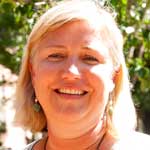Last month, I shared a guest blog post from my friend, Sally Wallace. Sally is the women’s ministry leader for St. Andrew’s Church. A little more about Sally:
 I am an English teacher, attorney, and mom of four kids. The only way this is accomplished with sanity is through the power of prayer; hence, this blog. My sweet husband and I live and work in Mount Pleasant, SC, and my greatest joy is watching the Lord work in the lives of the people I come into contact with – especially my family and friends. I love to knit, walk on the beach, and write. Also, I have been known to debate and/or argue the finer points of life, so if you have an opinion – bring it!
I am an English teacher, attorney, and mom of four kids. The only way this is accomplished with sanity is through the power of prayer; hence, this blog. My sweet husband and I live and work in Mount Pleasant, SC, and my greatest joy is watching the Lord work in the lives of the people I come into contact with – especially my family and friends. I love to knit, walk on the beach, and write. Also, I have been known to debate and/or argue the finer points of life, so if you have an opinion – bring it!
Today I’m excited to share another post from Sally with a great message about sharing our faith. Many of us feel “unqualifed” to share our faith but Sally encourages us to live in a way that inspires others. I hope Sally’s words encourage and inspire you today! You can read more from Sally on her blog, Life on Prayer.
One of my best friends is a successful realtor. However, she is a more gifted missionary. That woman loves people better than any other human being I know. She has a heart for human suffering and a plan to alleviate it. The other day, over coffee, she made a comment that I have pondered and that I pass along to you. “I love doing mission work, but I’m not qualified to witness to the people I serve. I’m not qualified to tell them about the gospel .” And that’s the real rub isn’t it? How do we become qualified to teach others about our faith?
As an educator, my favorite saying – and my basic educational philosophy – was “Education is not the filling of a bucket, but the lighting of a fire.” And, one of the ways that teachers light that fire is through a technique called “Scaffolding.” When we scaffold a student, we give that student support so that the student can “discover” the answer on their own. Basically, we give them the tools to uncover the knowledge, not just regurgitate our information. And the best teacher does this in a way that makes the student curious, in a way that lights a fire. For example, I can require my students to memorize my interpretation of, say, the symbol of the green light in The Great Gatsby– OR-I can ask a question, pose a problem, give a story from my life that makes them see the value of symbolism and how to interpret the deeper meaning in all circumstances.
The first place I ever saw this technique lived out was as I was a young mom, when I helped in our church Sunday school. My church used Maria Montessori’s method for spiritual formation. Her theory was that God was already IN the child, and that children, being offered the opportunity to discover God through the joy of work, prayer, and biblical problem solving, would have a more real and lasting knowledge of God.
One of the best and most moving focuses of this curriculum was on the parables. My favorite work available to the  children was the opportunity to inspect, plant, and grow their own mustard tree. You know, from the verse in Mark: “What shall we say the kingdom of God is like, or what parable shall we use to describe it? It is like a mustard seed, which is the smallest of all seeds on earth. Yet, when it is planted, it grows and becomes the largest of all garden plants, with such big branches that the birds can perch in its shade.” Mark 4:30-32.
children was the opportunity to inspect, plant, and grow their own mustard tree. You know, from the verse in Mark: “What shall we say the kingdom of God is like, or what parable shall we use to describe it? It is like a mustard seed, which is the smallest of all seeds on earth. Yet, when it is planted, it grows and becomes the largest of all garden plants, with such big branches that the birds can perch in its shade.” Mark 4:30-32.
Friends, I have read the parable of the mustard seed a million times and heard countless sermons on it. Most of those sermons boiled down to one simple fact: a small amount of faith is all we need. And I am sure that Jesus could just as easily have stated that fact – his followers could have memorized it, and that would be that. But I believe that Jesus was scaffolding – engaging us to discover the truth ourselves.
It wasn’t until I saw those 3 year old children plant the dust-sized seeds and discover for themselves that even THEY could coax it to grow, that I saw the deeper meaning of this parable. I could see for myself how the Planter of the seed didn’t really matter – it was what was inside that seed that counted.
So, for all of you who, like my friend (and myself) have worries about being qualified to carry the gospel, I think this parable really says it all. Who is qualified? Anyone. How do we give it? Plant the seed.
So, I leave you with a promise and a prayer. The promise is that of the amazing character of the mustard seed: The Gospel message, the truth of the kingdom of God, contains all it needs to grow and flourish, no matter who plants it. My prayer is that, as carriers of this seed, we will not simply try to pour our information onto people. I pray that our lives would be so full of the beauty, so full of kindness, so full of truth, as to inspire wonder in those we encounter – wonder at how to discover the truth and grow it themselves.
